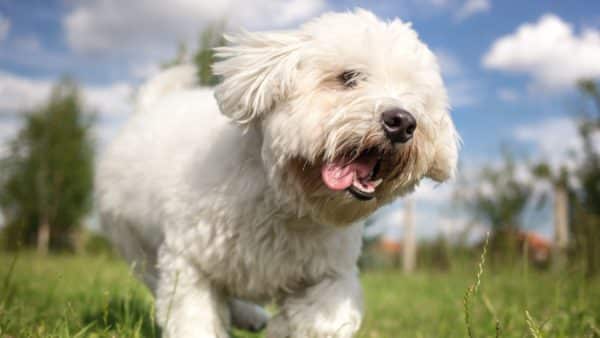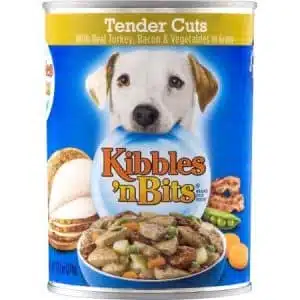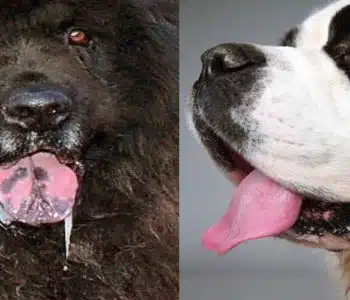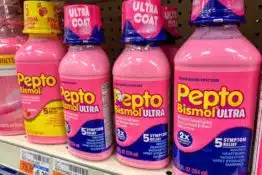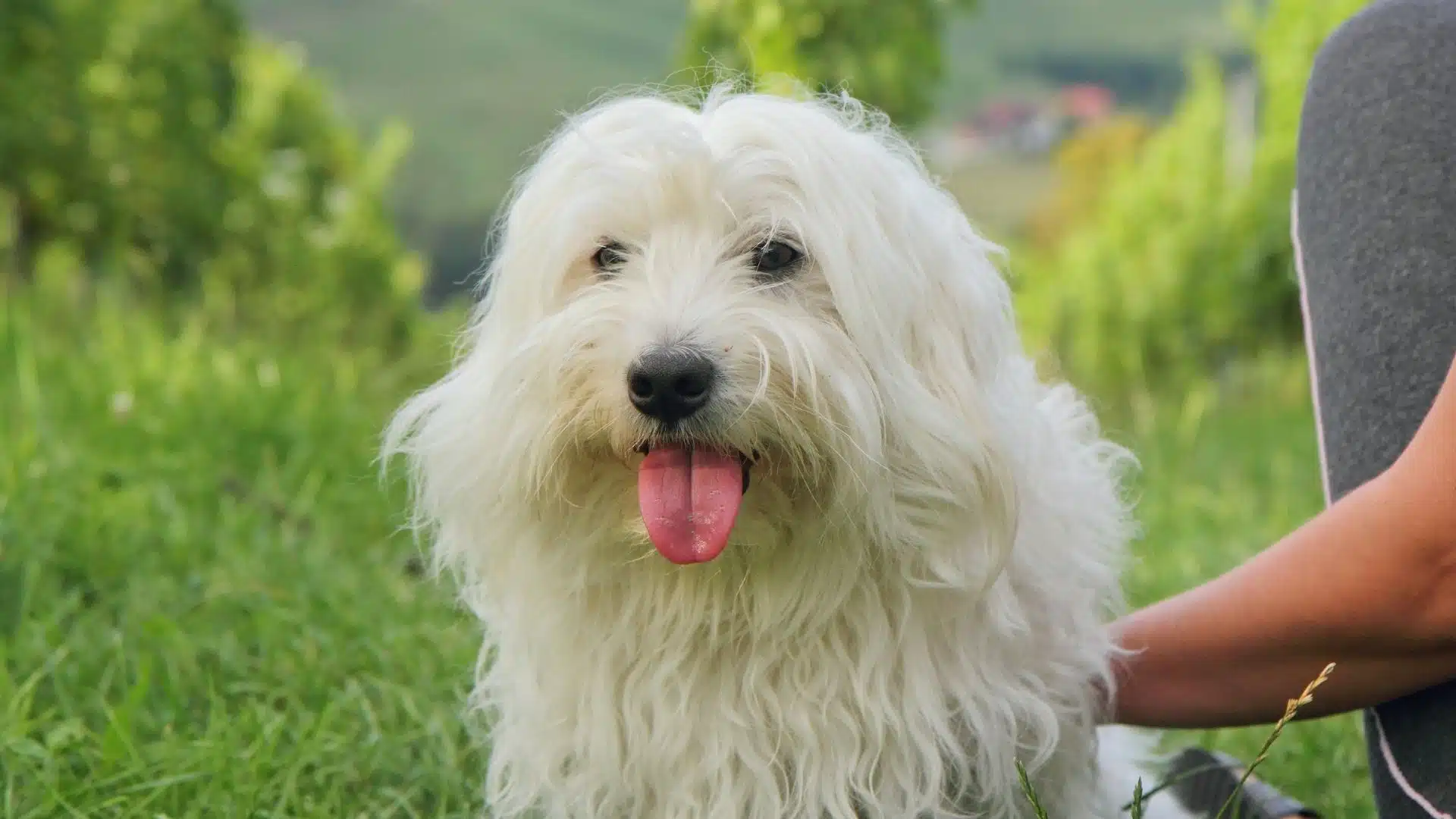
Coton De Tulear Dog Breed Guide: Facts, Health & Care
The Royal Dog of Madagascar
The Coton De Tulear originated in Madagascar, where they were also known as “The Royal Dog of Madagascar.” Aside from their appearance, the breed is well-loved for their sweet personality, making them a favorite not only in the United States but throughout the world.
In this complete guide, we explore the breed’s history, appearance, personality, and more. Scroll down to find out why the breed has earned its place in The American Kennel Club’s official list of breeds.
Breed Basics
| Breed Group | Non-Sporting Group |
| Temperament | Charming, Bright, Happy-Go-Lucky |
| Life Span | 15-19 years |
| Weight | 9-15 pounds (male), 8-13 pounds (female) |
| Height | 10-11 inches (male), 9-10 inches (female) |
| Colors | White |
| Origin | Madagascar |
Best Dog Food for Coton De Tulear Dog Breed
Selecting the best dog food for the Coton de Tulear breed involves considering their size, coat characteristics, and overall health. Opt for a high-quality small to medium breed dog food that includes real meat as the primary ingredient to support their muscle health.

- REAL MEAT FIRST: Blue Buffalo foods always feature real meat as the first ingredient; High-quality protein from real chicken helps your dog build and maintain healthy muscles; Plus they contain wholesome whole grains, garden veggies, and fruit
- FOR ADULT DOGS: BLUE Life Protection Formula adult dog food contains essential proteins and carbohydrates to help meet the energy needs of adult dogs, and features omega 3 & 6 fatty acids to promote a shiny coat and healthy skin
- ANTIOXIDANT-RICH LIFESOURCE BITS: A precise blend of antioxidants, vitamins and minerals carefully selected by holistic veterinarians and animal nutritionists to support immune system health, life stage needs and a healthy oxidative balance
- A NATURAL DOG FOOD: BLUE dry dog food is made with the finest natural ingredients enhanced with vitamins and minerals; BLUE contains NO chicken (or poultry) by-product meals, corn, wheat, soy, artificial flavors or preservatives

- Essential, high-quality protein for healthy muscle development, and carbs for energy for an active life.
- Calcium, phosphorus and essential vitamins for strong bones and teeth.
- Glucosamine is added for joint health and mobility support.
- Vitamins, chelated minerals and antioxidants contribute to your pup's immune system health.
- No corn, wheat, soy or chicken (or poultry) by-product meals.
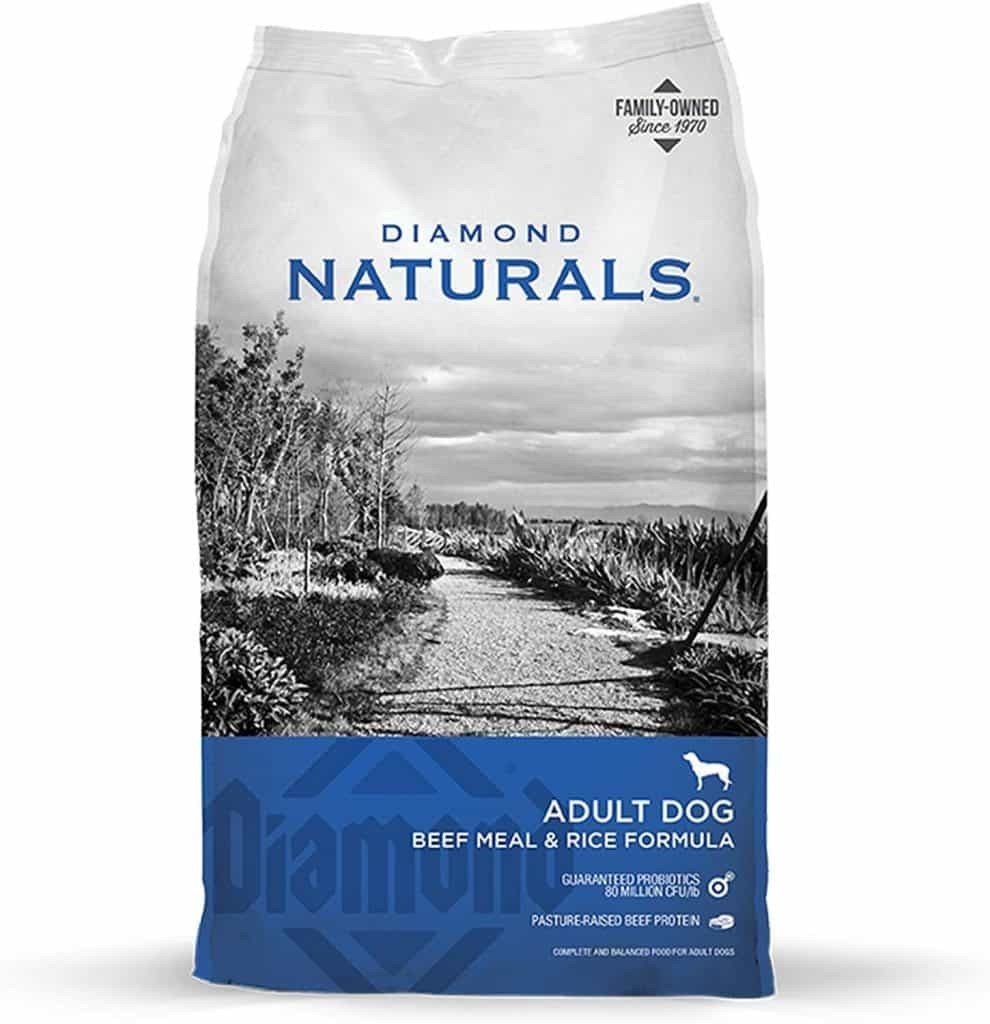
- Made in the USA by a family-owned company using quality ingredients from trusted domestic and global sources.
- With real pasture-raised beef protein as the #1 ingredient, this recipe helps support bones, joints, and lean, strong muscles.
- Beef protein provides energy and muscle building blocks, omega fatty acids promote skin and coat health, and superfood fruits like blueberries and oranges offer vitamins and minerals.
- Each serving includes species-specific K9 strain proprietary probiotics, plus antioxidants and prebiotics to help support healthy digestion, immune system health, and overall wellness.
- Made without corn, wheat, artificial flavors, or colors.
Coton De Tulear History
The Coton De Tulear (KO-Tone Dih TOO-Lay-ARE) derived its name from its cotton-like hair coat and the seaport of Tulear on the Island of Madagascar, where they came from. These charming dogs were highly favored by the island’s nobles and elites.
Much like Havanese dogs who traveled to Cuba, Cotons arrived in Madagascar several centuries ago. A Frenchman visiting the island in the 1790s brought some of these white dogs back to France and fine-tuned them to develop the breed. The introduction of the Coton De Tulear to North America soon followed. However, it was only in 2014 when the Coton was recognized by the AKC as its 179th breed.
Coton De Tulear Appearance
The Coton de Tulear can easily be recognized by their very soft, thick hair. They have a short and triangular head with a prominent black nose, and their somewhat round eyes are brown or black in color.
Size
The One Thing Pet Owners Regret Not Doing Until It’s Too Late
Is your pet safe?
1 in 3 pets will need emergency veterinary treatment each year and it is estimated a pet receives emergency care every 2.5 seconds in the U.S.
The average cost of treating a broken bone in dogs is $2,700. Cancer treatments? Up to $10,000.
It’s why so many pet owners say their biggest regret isn’t the vet bill—it’s not having pet insurance when they needed it most.
Ask yourself: “If an unexpected $5,000 vet bill hit tomorrow, could I afford it?”
If the answer is no, it’s time to get covered.
Take a look at Lemonade. They have a great app that actually works, they have an instant chatbot that is faster and, dare we say it, friendlier than most companies’ “real” customer service and a quick scroll through Reddit will uncover… people are really vibing with this brand.
So go check them out and take a look. It takes less than a minute.
Male Cotons are 25–30 cm (9.8–11.8 in) in height and weigh 4–6 kg (8.8–13.2 lb). Female Cotons are 22–27 cm (8.7–10.6 in) tall and weigh 3.5–5 kg (7.7–11.0 lb).
Coat & Color
Their voluminous, white, cottony hair coat is one of the hallmarks of the breed. The dense hair coat promotes air circulation and insulates the dog from temperature extremes.
Cotons are considered hypoallergenic because they are non-shedding and have low dander. Shedding generally occurs in puppies to give way to adult hair.
Their hair coat comes in 3 colors: all white, sometimes with tan or gray markings in the ear. There are also black and white and tricolor Cotons. However, black color in any age is a disqualification based on AKC standards.
Puppies may be born all white or with yellow, tan, roan, or black spots on their head, ears, and sometimes their bodies, but these spots usually disappear with age, leaving behind light shadings of gray or light tan.
Grooming & Maintenance
The Coton’s dense, long hair coat is prone to forming mats and tangles. Daily brushing using a pin brush with uncoated metal pins can help prevent this issue. Special attention should be paid when brushing behind the ears, elbows, and legs. A spray conditioner may be applied to lessen the possibility of hair breakage.
Use a fine-toothed metal comb for the hair on the Coton’s face. A cute topknot secured by a coated hair elastic can reveal the dog’s e eyes. Some cotton owners keep their pets’ hair coats short for easier care.
Bathing depends on how dirty your Coton gets. A whitening shampoo can help keep his hair coat looking sleek and shiny. After a bath, avoid rubbing your pet with a towel to prevent his hair coat from knotting up. Pat him damp-dry and blow him dry while brushing his coat.
The ears should be checked several times a week. Any excess hair should be removed. Ear cleaning may be needed when there is excess wax or debris in the ear canal. Your Coton will also need a good home dental regimen and proper nail care.
Coton De Tulear Temperament & Personality
“Naturally clownish, boisterous, lighthearted,” These are just some of the endearing descriptions of the “Royal Dog of Madagascar.”
Cotons are always on the lookout for a chance to spend time with their humans. These dogs crave attention. They can form strong bonds with family members, which makes them prone to separation anxiety and develop destructive behaviors.
These dogs are very friendly, even with strangers. They thrive well in a multi-pet household. Cotons benefit from early socialization so they would grow to be well-adjusted, confident, and happy dogs.
Female Cotons tend to be more independent compared to males and often dominate over them.
Although they tend to be quiet, they can become very vocal when excited and having fun. They can easily adjust to any environment.
Training Your Coton De Tulear
Cotons are very easy to train because they are eager to please people. But they can be stubborn and possess strong territorial instincts. It may be difficult to get them to be housebroken, but with a regular potty regimen and lots of positive reinforcement, the desired results can be achieved.
Training of puppies should start immediately after bringing them home. The first training regimens for your Coton puppy include housetraining and crate training.
Early socialization is very important to ensure that your Coton pup won’t have any problems meeting new people, dogs, and other pets as they grow and mature.
These dogs excel in agility and obedience events. They can also be trained to perform tricks.
Coton De Tulear Exercise Requirements & Energy Level
Coton De Tulears has moderate exercise needs. They will benefit from at least a 30-40 minute daily physical activity. These vivacious dogs are alert little lap dogs. They’re always on the lookout for a game. Daily walks or a game of fetch can help them burn pent-up energy.
Shorter walks are better over long distances, which can be tiring for their small legs. Make sure that your pet’s preventatives and vaccinations are up-to-date before taking your pet on outdoor excursions.
Adequate opportunities for physical and mental stimulation can keep your Coton busy and away from boredom.
Common Coton De Tulear Health Issues
The Coton is generally a healthy breed with a very low percentage of genetic health issues. According to the AKC, known incidences are about one to five percent.
The most serious medical conditions that they can possibly develop include back problems, eye conditions, and liver shunts. It’s important to remember never to give your dog human medication when it’s in pain; consult a vet first.
Health Concerns
- Progressive Retinal Atrophy and other eye problems
- Hip Dysplasia
- Luxating Patella
- Spinal Disc Disease
Recommended Health Tests from the National Breed Club:
- Patella Evaluation
- Ophthalmologist Evaluation
- Hip Evaluation
- Cardiac Exam
Read the Official Breed Club Health Statement.
Diet & Nutritional Needs: Feeding Your Coton De Tulear
High-quality pet food that is complete, balanced, and appropriate for the dog’s life stage (puppy, adult, senior) can sufficiently meet all the nutrients its body needs daily. Portion meals are better compared to leaving food out all day.
While treats are essential tools in training, they should be given in moderation as they are important sources of additional calories. Giving your dog human food and table scraps is not recommended.
But make sure that the food is free of ingredients that are harmful to dogs, such as high fat, artificial colors, and additives. If you have concerns about your pet’s diet and/or eating habits, consult with your veterinarian.
Tips for Adopting & Raising a Coton De Tulear
A Coton De Tulear puppy from a reputable breeder typically costs anywhere from $2000 to $3000 but a show or breedable quality pup may cost between $3000 to $4000. Make sure to ask the dog breeder for health certifications for the puppy and the puppy’s parents.
A much lower price for a Coton puppy can be available when you adopt from a shelter or a rescue. The average cost of adoption is between $150 to $300 to cover dog care expenses before adoption.
A Coton De Tulear gets along well with people and pets, which makes them a wonderful addition to any family. They thrive with lots of attention from their owner as well as plenty of opportunities for physical and mental stimulation.
If you’re looking for a pup that’s hypoallergenic, these smart and affectionate dogs are a great choice.
Coton De Tulear FAQs
Q: Is “Coton dog” the same as a Coton de Tulear?
A: Yes, “Coton dog” is a common abbreviation for the Coton de Tulear breed. It refers to the same small, fluffy, and charming dog breed.
Q: How much do Coton puppies typically cost?
A: The cost of Coton de Tulear puppies can vary based on factors such as lineage, breeder reputation, and geographical location. On average, prices can range from a few hundred to a couple of thousand dollars.
Q: How big do Coton de Tulear dogs get?
A: Coton de Tulear dogs are typically small in size, with adults weighing between 8 to 15 pounds. They stand around 10 to 12 inches tall at the shoulder.
Q: What does “Coton de Tulear” mean?
A: “Coton de Tulear” translates to “Cotton of Tulear,” with “coton” referring to their cotton-like coat and “Tulear” being a port city in Madagascar, the breed’s place of origin.
Q: What is the average lifespan of a Coton de Tulear?
A: Coton de Tulear dogs typically have a lifespan of 14 to 16 years, provided they receive proper care, nutrition, and regular veterinary check-ups.
Q: In what colors do Coton de Tulear dogs come?
A: Coton de Tulears come in various colors, including white, black, and white, tri-color (white, black, and brown), and various shades of gray. The breed’s coat is often parti-colored.
Q: How intelligent is a Coton de Tulear?
A: Coton de Tulears are known for their intelligence and trainability. They are quick learners and often excel in obedience training, making them suitable companions for various lifestyles.
Q: Do Coton De Tulear dogs bark a lot?
A: Cotons are average barkers. They usually bark when they see or hear something they are not familiar with. Persistent barking in cottons must be addressed by finding the root of the problem and addressing it appropriately.
Q: How many hours does Coton De Tulear sleep?
A: Cotons are not lap dogs. They usually sleep between 12-14 hours a day on average. They are always on the lookout for opportunities to interact and play with their humans.
Q: Does Coton De Tulear like to cuddle?
A: Cotons are sweet and affectionate dogs. They love to spend time cuddling with their owners. They thrive with plenty of attention and a great deal of companionship.
Q: Are Coton De Tulear easy to potty train?
A: Potty training may be a breeze for some Cotons but there are those that are quite stubborn and will need consistent training coupled with positive reinforcement to achieve desired results.
Official Breed Club: United States Of America Coton De Tulear Club
Rescue A Coton De Tulear: Coton De Tulear Rescue Of America
Official AKC Profile: Coton De Tulear Dog Breed Information
Breed Standard: Official Standard for the Coton De Tulear
Find a Puppy – AKC Marketplace: Coton De Tulear AKC Puppy Finder
Recommended Products for Coton De Tulear
https://www.alphapaw.com/products/dog-car-safety-seat
https://www.alphapaw.com/products/15-in-1-multi-chews
Similar Dog Breeds
Related Groups & Characteristics
80% of Dogs Develop Arthritis or Joint Pain by 7 Years old – Here’s How to Protect Them
Most of us train our dogs when they are puppies to jump up on furniture. We think it’s harmless (and easier than always lifting them), but for dogs, couches and beds are very high compared to the size of their bodies.
Every time they jump it compresses their back and applies enormous force to their joints.
It’s no wonder that an incredible 80% of dogs experience arthritis or joint pain by only 7 years old.
Luckily, there is a vet-recommended solution.
It’s the PawRamp by Alpha Paw. An adjustable ramp that allows dogs to safely get on and off couches and beds. PawRamp makes joining you in bed or on the couch effortless and fun.
As a bonus, you can use code SAVE35 to get $35 off the PawRamp today.

